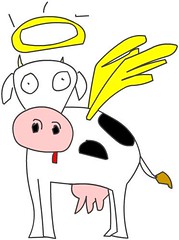Do you have any sacred cows? No, I don’t actually mean holy cattle—you know the cliché: something you absolutely cannot sacrifice.
We may be flexible about a lot of things in our writing—or not. During the various stages of development, we may be attached to certain characters or events or even words that we just refuse to part with in later drafts.
 Until we take our perfect (or pretty good) little baby out into the bright light of scrutiny and let our critique partners and beta readers tear into her. Sometimes an innocent little comment (“this doesn’t feel like the right word”) can feel like a full-fledged attack when we’re so attached to that word.
Until we take our perfect (or pretty good) little baby out into the bright light of scrutiny and let our critique partners and beta readers tear into her. Sometimes an innocent little comment (“this doesn’t feel like the right word”) can feel like a full-fledged attack when we’re so attached to that word.
But eventually, we often find that after a little time and thought, it’s not really as important as we thought—maybe it’s not the right word, or maybe the connotations aren’t what we’re going for. Maybe this character really is redundant. Maybe this event isn’t quite as critical as we thought—after all, they only accomplish X and couldn’t we put that in this scene . . . ?
And sometimes, no matter how much we think about it, there’s nothing we can do to “fix” it—or nothing we’re willing to do. This might be because our CP hasn’t seen our whole or latest draft, so they don’t know the full significance, or it might be a theme they didn’t notice. Or it might be an irrational attachment.
Sometimes we’re advised that there are no sacred cows—we should be prepared to change any- and everything in the quest to create the best book (and/or get published). But I wonder if being willing to lose everything is really the best route to create a better book.
What do you think? Are there really NO sacred cows? Are there things you absolutely could not change, even if it meant the difference between a million-dollar advance and bubkis?
Picture by Gamerscore Blog
 I think we’ve all been there: we get some piece of advice—from a crit partner, from an editor, from a total stranger—that just doesn’t work for our story.
I think we’ve all been there: we get some piece of advice—from a crit partner, from an editor, from a total stranger—that just doesn’t work for our story.  . I’m wondering about the mechanics of critique groups. I recently joined a second online critique group, a brand new one just getting off the ground. We’ve kind of struggled to figure out how our new group was going to work.
. I’m wondering about the mechanics of critique groups. I recently joined a second online critique group, a brand new one just getting off the ground. We’ve kind of struggled to figure out how our new group was going to work.  voted for your admittance, and any prospective members you voted for (if they got enough votes). So while we have some 20+ members (I think?), most people have only 2-4 others they’re actively critiquing.
voted for your admittance, and any prospective members you voted for (if they got enough votes). So while we have some 20+ members (I think?), most people have only 2-4 others they’re actively critiquing. 